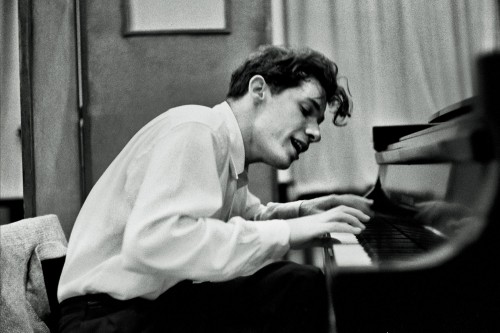Glenn Gould, the James Dean of classical music
Posted by Richard Rawlinson
A follow up to Charles’s lyrical piece about the inadequacy of music at funerals.
With recorded music at funerals, people tend to sit down, listen, tap a foot, perhaps, and, if it’s really working its magic, meaningfully relate the music to the memory of the dead person. Whether pop lyrics or piano concerto, our response is predominantly a private reaction within the mind, but we’re likely to be distanced from full interaction by the fact the sound is projected into the room by loud speakers. It’s from a different time and place.
Live music emanates from activity in the room. If it’s a hymn or song, we stand up and participate, granted with varying degrees of success. The result is unlikely to be as polished as the professional recording but it punches beyond its weight due to its resonance as a collective effort unifying participators—created in real time, not just imbibed in real time. It’s the same principle when people recommend family and friends carry the coffin themselves.
Imagine the hymn or song is led, not by an organist or pianist present at the funeral, but by a recorded musical accompaniment. Aside from bringing to mind karaoke, the full impact of live music is again diminished.
There’s also a case for live music performed by professionals, whether choir, string quartet or guitar-strumming solo-singer. Sure, the passive act of sitting down and listening to a performance doesn’t seem much different to doing the same for a recording. The difference is again that the musicians are sharing the moment. The chosen music might be universal but the rendition, flaws and all, is for the dead person and those present.
Footnote: I chose the image above of the iconic Glenn Gould as he exemplifies a pianist who brought his own unique style to music by the greats such as Bach. As the film below shows, Gould reminds us that the scores of composers are not diktats set in stone but are guides for artists who surprise with their interpretations of mood. Ironically, this cool, solitary genius hated performing concerts, preferring to record in a studio.



Couldn’t agree more about the power of live music. Unfortunately for most families, professionals work out expensive. Professional choirs seem to quote £300/£350, which seems to me quite a lot per crochet, though I guess they are likely to have to travel some distance. Which brings me to local community choirs. Out of Bangor Community Choir grew Threnody; we sing a capella, 3 or 4 part harmony, and we offer a choice of songs and hymns in English and Welsh. Sometimes we have enough warning to learn something new on request. And we only charge something for travel. (Sorry if… Read more »
Singing: tick.
Live music: tick.
What’s missing? Dancing.
I am serious. Unless we can take an embodied approach to purging our griefs, they will clog us up far longer than is necessary.
It’s time to overturn all crushing strictures and taboos, and dance our way to joy and health. Foot-tapping’s just the start …
Lovely concept; do you think, Kathryn, if we said “movement” as opposed to “dancing,” we might make a start? So people don’t think we mean dancing like Fred Astaire or Darcy Bussell ?(i.e. “but I can’t dance.” “But you can move, we almost all can.”) And your point about dancing to health links in my mind with Kristie West’s point that sometines people hang on to the pain of grief, rather than doing things that will heal them and make them happy? Amongst which, at the top, come singing and dancing. Interesting how often bereaved people join a funeral choir… Read more »
Yes, ‘movement’ is big and baggy and encouraging. I mean embodied connection with music/rhythm for getting some stuff expressed.
The Kiwi haka (see a previous post) combines both movement and chant, plus some sticking out of the tongue for good measure. 😛
Its a fair point. Hymns are good. I love hymns. Despite an almost total rejection of Christian theology I do enjoy singing hymns. Sadly, I am getting quite tired of being the only person in the crematorium singing. Literally the only one. It can be quite embarrassing!
We are very fortunate in having a guitar soloist who has offered his services for free. We are looking forward to the first time his services are needed!
Like Jennifer, I love to hear a good hymn, sung. If sung with gusto, it matters not the quality of the voice. I tend not to sing because I am rubbish at timing music wise. The problem is that I rarely get anyone who does more than mumble the hymn. I have had one funeral where they had ‘Jerusalem’ and the daughter of the deceased ( a former professional singer) belted it out. It was lovely. But she was the only one singing. The professional musicians at the crematoriums I work at moan about the karaoke hymns played on cd,… Read more »